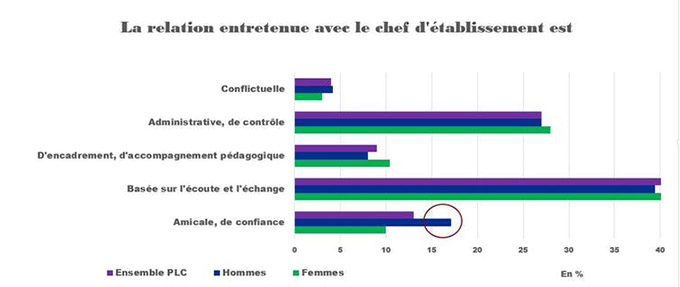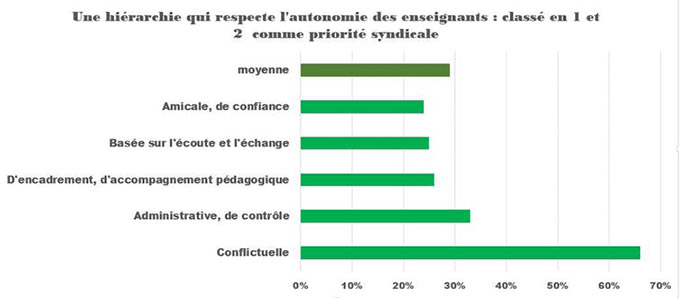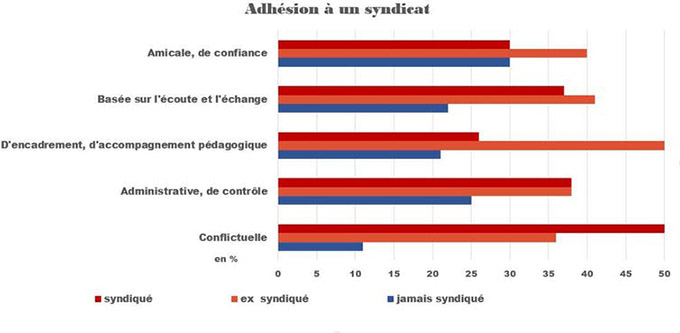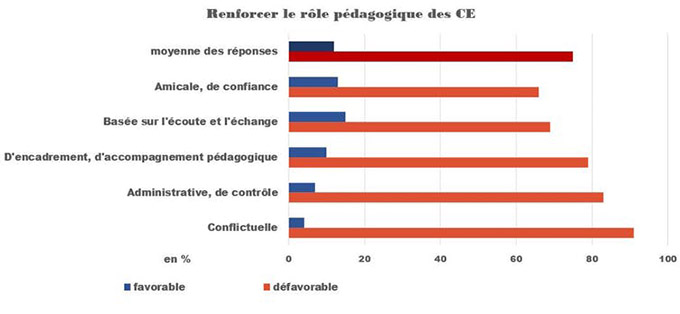While teachers generally take a good look at the role played by their school leaders, this report also suffers from more marked tensions, as shown by the results of the Militens survey (conducted by CERAPS of the Université de Montréal). Lille and the DEPP, department of statistics of the ministry, with the relay of the teacher unions). Expressed by Emmanuel Macron during his campaign, the desire to develop the autonomy of schools in the secondary should also put it to the test.
Persuasion takes precedence over taxation
When teachers are asked to describe their relationship with their head teacher, only 31% of them display anti-hierarchical feelings, judging this relationship as “conflicting” or “administrative, controlling”. This last modality, 27% of the answers, can indicate as much indifference – referring to a purely bureaucratic report to the leader – as some distrust, referring to a possible sense of supervision, for example. In contrast, 54% of teachers use a positive vocabulary, evoking a relationship that is either “listening and exchange-based” or “friendly, trusting”.

Enquête Militens CERAPS Lille/DEPP/IR FSU
This result is enough to satisfy the headteachers. It is not so surprising, because the teachers benefit from a hierarchical report not authoritarian. The power of their direct leaders rests more on persuasion than on taxation. Teachers experience a tension between the attachment to their professional autonomy and the need for external reinforcement in the exercise of an increasingly difficult profession.
One could compare this situation with that of a health center, in which the hierarchy of proximity, occupied by computer-based management tasks, no longer has the time to interact with staff: economists Mathieu Detchessahar and Anouk Grevin estimate that “the employees suffer much more, finally, of the absence of management than of its too great presence“. Another example offering a perspective: to EDF, agents are satisfied more than 80% of their n + 1, because they naturalize the need for supervisors and that these direct superiors constrain them less and help them more than the hierarchy further away.
A will of status quo
But when one passes from this observation of the lived to the general principles, the tone changes: the teachers are opposed massively to the idea of ”reinforcing the educational role of the heads of establishments (visits in the courses, academic notation …) “. 44% are very unfavorable and 28% rather unfavorable. This consensus against a possible extension of the power of the hierarchy comes in particular from the embarrassment that it feels when it is necessary to satisfy the request of accompaniment expressed by the personnel.
Indeed, 48% of teachers (24% really dissatisfied) denounce the “lack of support” of the hierarchy, in the broad sense, including disciplinary inspectors and the rest of the institution, unpopular. But this criticism is rejected by the other half of the body, whereas in this list of professional difficulties, six collect large majorities: the report to the students, the increase of the meetings, the multiplication of the reforms … To appreciate the work of the Hierarchy, the experience of the respondents plays a major role: a substantial part of the teachers do not solicit it …
The profession does not think that the hierarchical problem is imperative, despite the persistence of rumors attributing to the new minister the desire to strengthen the powers of school heads. When asked to classify priority union demands, the proposal “a hierarchy that respects the autonomy of teachers” does not arouse overwhelming enthusiasm.
In fifth position (out of seven), it is supplanted by quantitative demands (salaries, number of students) and educational demands (profound change in the education system, vocational training, etc.). The score (ranked weighted average) of this claim is 10/20, evidence of an average echo. As long as the status quo is maintained, the professors will not consider urgent a trade union intervention on management.
A cleaved profession
However, behind this general panorama, there are clear divisions. A very minority group (4%) declares itself in conflict with the school heads and is coherent, since at 79%, it is very unfavorable to the strengthening of the role of the hierarchy and considers that it does not not support. This aspect is correlated with the professional difficulties that these teachers seem to experience, twice as many declaring themselves dissatisfied with their job (47% compared to 25% on average).
They place the priority of union action in this field (32% rank the hierarchical issue first and 34% second). This group feels a need for protection, which is manifested by a greater propensity to unionize (+16 points). Moreover, activists spend proportionally more time defending this category of teachers, using the upper administrative layers: rectorates or even ministry.

Enquête Militens CERAPS Lille/DEPP/IR FSU

Enquête Militens CERAPS Lille/DEPP/IR FSU
Symmetrically, a larger group (13%) reports a “friendly, trustful” relationship with the EC. As Léa Palet’s current thesis shows, some of these teachers have close relations with their leaders, who are beyond the professional sphere. Logically, never-unionized staff are overrepresented (+6 points) and this category rejects less reinforcing the role of the EC (-6 points). However, it is not acquired because of a more vertical management (66% are hostile anyway), because it draws its satisfaction in its proximity to the authority. These teachers are much more likely to be men (Figure 1): closer relationships with management are one of the factors behind gender differences in career.

Enquête Militens CERAPS Lille/DEPP/IR FSU
A relationship degraded by the reform of the college?
An Ipsos / SNES survey conducted in March 2018 among 603 teachers shows a strong increase in the feeling that “the EC intervenes too much in the educational field to the detriment of the freedom of the teachers”. Support for this proposal has increased from 17% to 40% in four years! While a majority of teachers still reject it, but the idea that “the head of school plays an important role in increasing the workload” is also approved by 70% of teachers (+ 10 points). How can we explain the spectacular weakening of the image of school heads with their subordinates, which is consistent with the rise in management-related conflicts observed by the SNES-FSU?
The political context may have played out: the appeased results of the 2014 CSA / SNES survey would have been influenced by the action of Vincent Peillon, a minister from secondary school, who understood his culture. But the most obvious hypothesis rests on the confrontation generated by the reform of the college in 2016-2017, rejected by the professors and supported by the school heads. Philippe Tournier, Secretary General of the main trade union of the EC, the SNPDEN UNSA, he did not open his congress stating that this reform has caused “a crisis that has profoundly marked our colleagues, whose traces are far from to have disappeared?
However, the evolution of opinions between college and high school teachers is strictly parallel, instead of being more important among the first. Even if the hardening of the relations in the college necessarily has an echo in the high school, because of the circulation of the teachers, one must look for other reasons.
Author Bio: Laurent Frajerman is a Researcher specializing in teacher engagement, 20th Century Social History Center at the University Paris 1 Panthéon-Sorbonne

